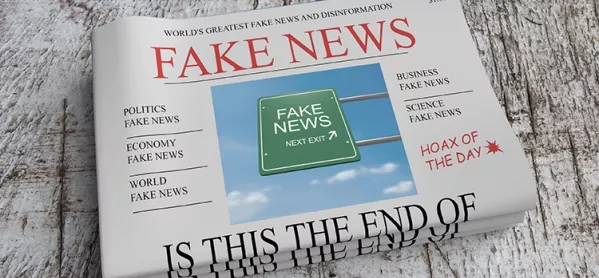Fake news. We’ve heard about it, we’ve seen it and we’ve probably even fallen for it. While fake news is not a new phenomenon, the rise of digital media has seen it gain unprecedented momentum - and notoriety - in recent months.
Young people growing up today are surrounded by digital technology. Whether they’re using an app on their mobile phone, reading a book on their tablet or doing their homework on a computer, technology is embedded in every part of their lives. This means that children today are highly likely to encounter fake news on a regular basis.
In this digital age, children who can’t question and determine the reliability of the information they find online will be hamstrung at school, at work, and in life. What’s more, fake news poses even wider societal threats to democracy, confidence in governance and trust in journalism.
More children than ever are using digital media as their main source of news and one child in five believes everything they read online is true. So are we doing enough to equip young people with the critical literacy skills they need to navigate the potential pitfalls of the digital world and fake news?
This is the question at the heart of a new commission launched today by the All-Party Parliamentary Group on Literacy, in partnership with the National Literacy Trust, Facebook, First News and The Day. Over the next year, the commission will look at the impact of fake news on children and young people and examine the teaching of the critical literacy skills students need to identify it.
By bringing together the greatest minds and authorities on fake news and education, the commission will give us a fantastic opportunity to make the case for critical literacy to sit at the heart of our education system. We want every child to have the chance to develop the critical literacy skills they need to survive and thrive in a digital world.
We believe that teachers are the key to boosting children’s critical literacy skills, but we know that they simply can’t do this without proper training, support and resources. To overcome these barriers, we need to first hear from teachers about whether fake news is a problem in their classrooms and where they think key critical literacy skills should be taught.
The National Literacy Trust has launched a survey, which runs from 13 September-22 October 2017, for teachers to inform the commission, as well as surveys for primary and secondary school students. The trust has also published a series of fake news resources for primary and secondary schools. In addition to gaining key insights from teachers on the teaching of critical literacy skills, the survey will help us understand what children know about fake news and how good they are at spotting it.
Jonathan Douglas is director of the National Literacy Trust. He tweets @JDLiteracyTrust
Want to keep up with the latest education news and opinion? Follow Tes on Twitter and like Tes on Facebook

